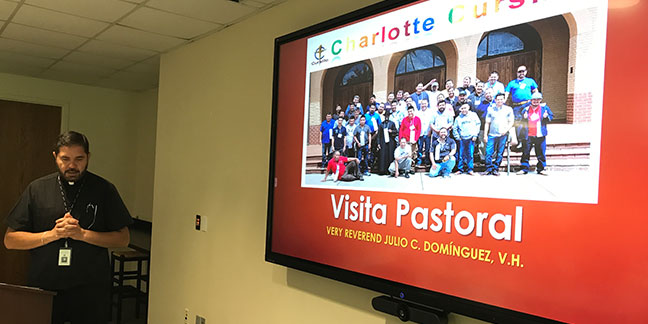 CHARLOTTE — Father Julio Dominguez, the episcopal vicar for Hispanic Ministry in the Diocese of Charlotte, is making a series of pastoral visits to the vicariates and various apostolic movements across the diocese. With the Hispanic community representing nearly half of the Catholic population in western North Carolina, the aim of these visits is carrying out and publicizing the pastoral priorities announced earlier this year by Bishop Peter Jugis. Father Dominguez aims to visit every vicariate in the coming months, Sister Joan Pearson said.
CHARLOTTE — Father Julio Dominguez, the episcopal vicar for Hispanic Ministry in the Diocese of Charlotte, is making a series of pastoral visits to the vicariates and various apostolic movements across the diocese. With the Hispanic community representing nearly half of the Catholic population in western North Carolina, the aim of these visits is carrying out and publicizing the pastoral priorities announced earlier this year by Bishop Peter Jugis. Father Dominguez aims to visit every vicariate in the coming months, Sister Joan Pearson said.
“We are halfway through the process, and we still have seven visits pending, four to vicariates and three to apostolic groups,” said Sister Joan, assistant to the vicar at the Charlotte Pastoral Center. “Father Julio wants to hear the questions and proposals of the people, in order to continue to grow the Hispanic pastoral plan for the diocese.”
During the visits, Father Dominguez shares the development plans for Hispanic ministry – the expansion of evangelization and diocesan pastoral priorities – and then has an open dialogue with participants to present any concerns, questions or needs of their community.
Sister Joan commented that she has been glad to see that people are not only thinking of their local parish, but of the entire diocese as a whole, “in a living community,” that is coming together to evangelize and make plans to further grow the Catholic community.
Regarding the participants, Father Dominguez said that the leaders of the different ministries are especially invited to the meetings, along with the faithful who are also more than welcome to join.
“We are thrilled to see even priests and deacons come out to the meetings, and it gives us joy because it motivates people when they see that their pastors are interested in them and want the best for the Hispanic ministry,” Sister Joan said.
During the meetings, attendees are asked to scan a QR code with their mobile devices to open an anonymous survey. The questionnaire includes multiple choice and open questions, where parishioners can elaborate on their concerns or questions regarding the services they expect to receive from their Church in the coming years.
The answers are diverse among the apostolic movements and various ministries. However, Sister Joan explained, one can see an interest in generating a deeper level spirituality through requests for more retreats, family assistance, evangelization and more.
Referring to the presence of the coordinators of the Hispanic ministry of the vicariates in each of the meetings, Father Dominguez expressed that these meetings “empower the coordinators.” They are valuable people delegated by the bishop to serve in the implementation of his pastoral priorities and to accompany the faithful in their spiritual journey.
In the Diocese of Charlotte, Hispanic ministry coordinators are on the payroll to manage and oversee local missions. Currently, there are 10 coordinators, one for each vicariate.
Sergio López, coordinator of the Winston-Salem vicariate, said that, “in addition to transmitting and receiving valuable information, the pastoral visit to his vicariate has served as great support for the work of the coordinators, especially lay people.”
The pastoral visit in the Winston-Salem vicariate brought together leaders and parishioners from St. Benedict the Moor Parish in Winston-Salem, Our Lady of Grace Parish in Greensboro, Holy Family Parish in Clemmons, Divine Redeemer Parish in Booneville, and Holy Angels Parish in Mount Airy.
“It’s been a spark of interest among parishioners,” said Deacon Enedino Aquino, Hispanic ministry coordinator in Greensboro. “Sometimes we can ‘fall asleep’ in our missions, and this meeting has been a ‘shake’ for people to get involved again. To learn about the programs they develop, the resources available and the priorities at hand.”
The visits will conclude this Fall, after which there will be an evaluation and formulation of the pastoral plan for the Hispanic ministry of the Diocese of Charlotte, with the goal to provide abundant activities and foster continued growth in years to come.
— César Hurtado


